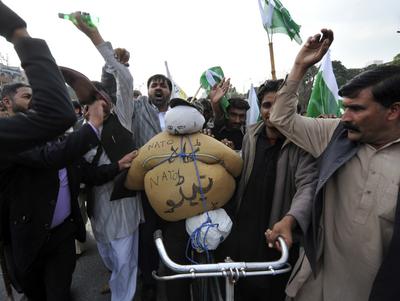Next, ‘the 2 May incident’, as Pakistanis refer to it, or the CIA covert operation that killed Bin Laden, pushed relations to the brink, and many thought it couldn’t possibly get any worse. But it did. On 26 November, NATO forces accidently killed 24 Pakistani soldiers in Mohmand Agency. Pakistan’s Foreign Minister said the attack ‘demonstrated complete disregard for international law and human life and was in stark violation of Pakistani sovereignty’.
Pakistan–US relations are on life support. Pakistanis don’t trust the United States and Americans don’t trust Pakistan. Recent public polling showed that 55 per cent of Americans view Pakistan as an enemy and 69 per cent of Pakistanis view the United States as an enemy. Malaise doesn’t just exist at the ‘street’ level. Adm. Mike Mullen, former Chairman of the Joint Chiefs of Staff, told a Senate inquiry that the Haqqani network was a ‘veritable arm’ of the ISI (Pakistani intelligence). In Pakistan, well-known cricketer turned political candidate, Imran Khan led a two-day sit-in to block NATO supply routes in protest against the NATO strikes that killed Pakistani soldiers.
Can the downward spiral be reversed in 2012? One key thing that will drive relations (again) in 2012 is Afghanistan.
Afghanistan has become too central to the relationship between Pakistan and the United States. While ideally the US and Pakistan should conduct a bilateral relationship without a continual focus on Afghanistan, the unfortunate reality is that the US desire to eliminate terrorism and get out of Afghanistan militarily means that Pakistan has become a lever of US policy in Afghanistan.
The United States needs Pakistan to achieve a political settlement in Afghanistan that will earn it a modicum of respectability. One of the key things highlighted by Pakistani academics when talking about Pakistan–US relations is that both parties agree on what needs to happen to achieve a stable, secure Afghanistan, but the mechanisms on how to achieve these goals differ greatly.
Pakistan’s strategic calculus is at odds with the US’. The military has hedged its bets using the Haqqani network and the Afghan Taliban to counter the future US withdrawal and India’s increasing influence in Afghanistan. At the same time, the US calls publically for Pakistan to sever all ties with the Haqqani network and conditions military and civilian aid on terrorism cooperation.
Pakistanis complain loudly that the United States simply doesn’t understand Pakistan. That is probably true. Few understand how much the ‘threat’ of India colours Pakistani perceptions of the world. Pakistanis genuinely fear being encircled by India and are anxious that Afghanistan too will fall under India’s influence — hence the support for militant networks.
So who will have to make more concessions to the other? In 2012, it is likely to be the United States. As 2014 draws closer, the onus falls on the US to work with Pakistan constructively because soon, the US will need Pakistan more than Pakistan needs the United States.
Pakistan is too important to ignore and needs to be viewed through a new strategic lens. Moving forward, Pakistan is not only crucial to a political settlement in Afghanistan, but is a state with nuclear weapons, a strong army, weak democracy, as well as an economy that is unable to provide opportunities for an ever-increasing and youthful population. The problems facing Afghanistan have defined the last decade in the region, Pakistan will define the problems of the region over the next decade — and all policy makers need to be congnisant of this.
Alicia Mollaun is a PhD candidate at the Crawford School at ANU and is based in Islamabad.


Two comments:
1. “the US will need Pakistan more than Pakistan[I ELITE] needs the United States”. Even the revised version of the claim is unlikely to be correct because Pakistan will be isolated from the world once USA becomes openly hostile to Pakistan. China will continue to give arms, etc. But that will not lessen the international isolation, which will disproportionately affect Pakistan’s elite who shop and holiday in the West.
2. “Few understand how much the ‘threat’ of India colours Pakistani perceptions of the world… hence the support for militant networks.” Most of us understand this. But is it wise to surrender the masses to wolves, who will definitely decimate the masses and possibly (will be tamed just in time to) maul India?
It is rare to see arguments sympathetic to Pakistan in an Australian forum. Demonisation a la Sheridan is more common. Ms Mollaun could have legitimately set her narrative further back in the past by pointing out that the United States missed a great opportunity to present a different face to Pakistan by sending a high-level representative in the wake of the terrible flooding of the Indus. Former Foreign Minister Smith performed this role admirably for Australia, while Hillary Clinton was AWOL on that occasion. The strange story of the letter of Ambassador Hussain Haqqani calling for US assistance in undermining the Pakistani military has been a further nail in the coffin of US-Pakistani relations.